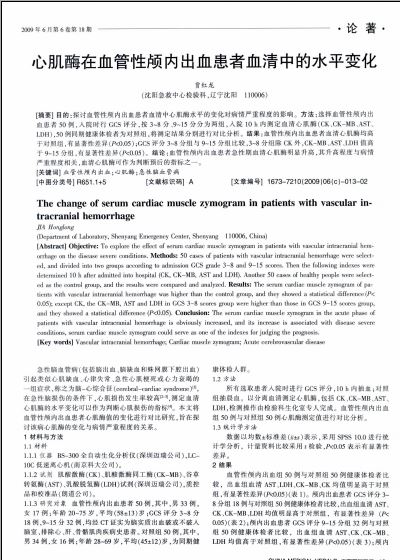心肌酶在血管性颅内出血患者血清中的水平变化(1)
 |
| 第1页 |
参见附件(1225KB,2页)。
[摘要] 目的:探讨血管性颅内出血患者血清中心肌酶水平的变化对病情严重程度的影响。方法:选择血管性颅内出血患者50例,入院时行GCS评分,按3~8分、9~15分分为两组,入院10 h内测定血清心肌酶(CK、CK-MB、AST、LDH),50例同期健康体检者为对照组,将测定结果分别进行对比分析。结果:血管性颅内出血患者血清心肌酶均高于对照组,有显著性差异(P<0.05);GCS评分3~8分组与9~15分组比较,3~8分组除CK外,CK-MB、AST、LDH值高于9~15分组,有显著性差异(P<0.05)。结论:血管性颅内出血患者急性期血清心肌酶明显升高,其升高程度与病情严重程度相关,血清心肌酶可作为判断预后的指标之一。
[关键词] 血管性颅内出血;心肌酶;急性脑血管病
[中图分类号] R651.1+5[文献标识码]A [文章编号]1673-7210(2009)06(c)-013-02
The change of serum cardiac muscle zymogram in patients with vascular intracranial hemorrhage
JIA Honglong
(Department of Laboratory, Shenyang Emergency Center, Shenyang 110006, China)
[Abstract] Objective: To explore the effect of serum cardiac muscle zymogram in patients with vascular intracranial hemorrhage on the disease severe conditions. Methods: 50 cases of patients with vascular intracranial hemorrhage were selected, and divided into two groups according to admission GCS grade 3-8 and 9-15 scores. Then the following indexes were determined 10 h after admitted into hospital (CK, CK-MB, AST and LDH). Another 50 cases of healthy people were selected as the control group, and the results were compared and analyzed. Results: The serum cardiac muscle zymogram of patients with vascular intracranial hemorrhage was higher than the control group, and they showed a statistical difference (P<0.05); except CK, the CK-MB, AST and LDH in GCS 3-8 scores group were higher than those in GCS 9-15 scores group, and they showed a statistical difference (P<0.05). Conclusion: The serum cardiac muscle zymogram in the acute phase of patients with vascular intracranial hemorrhage is obviously increased, and its increase is associated with disease severe conditions, serum cardiac muscle zymogram could serve as one of the indexes for judging the prognosis.
[Key words] Vascular intracranial hemorrhage; Cardiac muscle zymogram; Acute cerebrovascular disease
急性脑血管病(包括脑出血、脑缺血和蛛网膜下腔出血)引起类似心肌缺血、心律失常、急性心肌梗死或心力衰竭的一组症状,称之为脑-心综合征(cerebral-cardiac syndrome)[1],在急性脑损伤的条件下,心肌损伤发生率较高[2-3] ......
您现在查看是摘要介绍页,详见PDF附件(1225KB,2页)。